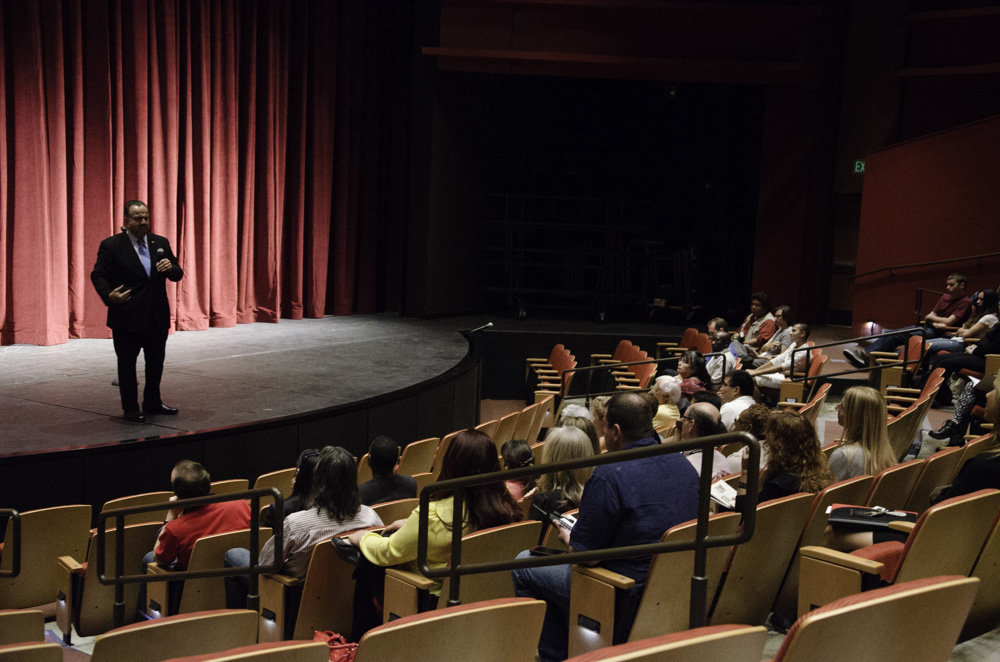L.A. Community College District Chancellor Francisco Rodriguez spoke to an audience at Pierce College on March 26, where he addressed the district’s budget woes and answered questions about Pierce’s vacant cafeteria.
Before Rodriguez’s address began, Facilities Director Paul Nieman approached audience member and former Calabasas Mayor Dennis Washburn. Nieman and two armed officers escorted the audibly upset Washburn from the room.
“This is not a way to run an airline, I’ll tell you that,” Washburn said as he exited the building. Washburn is also a former director of the Pierce Foundation and was a write-in candidate in the recent Board of Trustees election.
Pierce College President Kathleen Burke took the stage after the incident to welcome Rodriguez, and in her introduction speech made reference to the event’s private nature.
“I just want to remind everybody this isn’t a public event,” Burke said. “This is just for faculty, staff and students of our college.”
Fliers for the event made no reference to that fact, however, and listed only the “Conversation With The Chancellor” tagline, accompanied by Rodriguez’s name and the location, date and time of the event.
A listing for the event on the Pierce website had the description, “This event, open to Pierce College students, faculty and staff, will lead up to the April 2 Investiture Ceremony at East LA College for LACCD Chancellor Francisco Rodriguez.” The listing did not explicitly preclude public attendance.
In his speech, Rodriguez addressed several issues primarily centered around the district’s budget woes during the recession, and attempted to reassure audience members that those issues are in the past.
“I’m not concerned about this year’s budget, or the following year’s, but three or five years from now,” Rodriguez said. “And the good news is, we’re finally out of the recession.”
Rodriguez said that between the 2008-09 and the 2013-14 school years, the LACCD cut its enrollment by 20,000 full-time students. He added that this year, the district has started to increase enrollment to pre-recession numbers.
At the end of his address to the audience, Rodriguez called for questions. One student asked Rodriguez why there were no notifications on the vacant cafeteria to explain the absence of food vendors. Burke stepped onto the stage and redirected the student’s question to Associate Vice President Larry Kraus.
“I assume you’re talking about the fact that the cafeteria had been open at one point, and that the contract wasn’t renewed with that company,” Burke said. “Larry, is Larry [Kraus] still here? So you’ll take care of that Larry?”
Kraus stood and answered affirmatively.
The Roundup approached Kraus after the event, but he did not have a clarification.
“No, I don’t have any [answer],” Kraus said. “I don’t have any information right now.”
Rodriguez addressed a question about whether costs to operate the cafeteria were taken into account before its construction during the recession.
“The fact that you have some capital capacity, capital meaning facility, it makes sense to me that whatever solution is customized here, that we try to utilize what we have in place. So that we could have a return on the investment that was made, those public tax dollars by the way,” Rodriguez said. “So that’s the optimal solution, one that combines the assets of the institution. L.A. City College, the beautiful kitchen, we’re not using it, those sorts of things. Uh, so, what we want to do is, you know, and, when the district was running food services through a variety of mechanisms, it was spending, it was costing the district about $700,000 per year to do that.”
According to budget information on the LACCD website, the District’s 2014-15 for all funds is about $3 billion.
It is still unknown when the cafeteria will be operational, or what the district’s official reason for its vacancy is.




